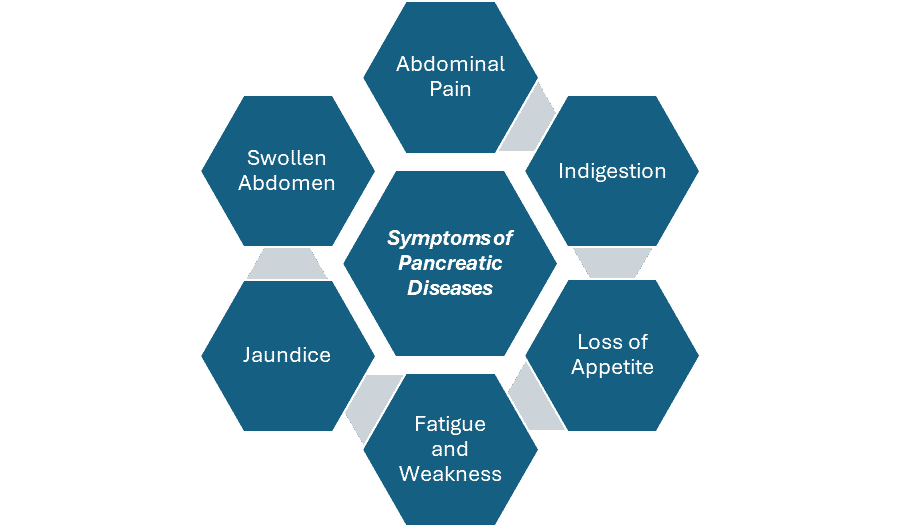The pancreas, an essential gland in the body, is situated in the upper part of the abdomen. The organ is approximately six inches in length and is encircled by the stomach, liver, spleen, and gallbladder. It is an important part of the digestive system and plays an essential role in transforming the food we eat into fuels for the body's cells.
The pancreas is situated in the upper abdomen and plays an important role in maintaining digestive and metabolic health. Pancreas has two main functions:
Pancreatic diseases involve different conditions that impair the pancreas' ability to function properly. When the pancreas is affected, it can cause problems with digestion, blood sugar control, and overall health. Here are some common pancreatic diseases:
Acute pancreatitis is a condition that arises from inflammation in the pancreas. The enzymes/enzyme-rich juice released by the organ to help break down the food for digestion gets activated while still inside the organ and begins to digest the pancreatic tissue itself. Acute pancreatitis is often caused by gallstones, heavy alcohol consumption, medications, infections, etc. Mild to severe abdominal pain, diarrhoea, jaundice, fever, and rapid pulse can be symptoms of acute pancreatitis.
Chronic pancreatitis is a slowly progressing condition where the pancreas becomes scarred over time, leading to a decline in its production of digestive enzymes. It is a progressive condition that worsens over time leading to problems with digestion and blood sugar control. Chronic pancreatitis can cause very severe pain, digestive issues, diabetes, jaundice, etc.
Pancreatic cancer is a type of cancer where pancreas cells grow uncontrollably. The abnormal cells don’t work as normal healthy cells and invade nearby tissues or spread to other parts of the body. Pancreatic cancer could also raise the likelihood of developing other forms of cancer. The condition is hard to diagnose as the symptoms or signs usually occur in the advanced stages. It is a bit more prevalent in males, individuals who smoke, and those with a family history of pancreatitis.
Pancreatic cysts occur when the pancreas develops sacs filled with fluid. They can usually be harmless or benign but in some cases develop to be precancerous. The condition is more common in old age people. Most pancreatic cysts don’t show any symptoms and get detected during scans of other medical issues. Although symptoms of pancreatic cysts may not always be obvious, they can include vomiting, persistent abdominal pain, feeling full quickly while eating, etc. While Pseudocysts develop in the abdomen near the pancreas. The condition is associated with damage to the pancreas or inflammation. Pseudocysts can be caused by acute or chronic pancreatitis. When the pancreas gets inflamed or injured, the digestive fluids, enzymes, and tissue debris can collect in a sac-like structure near the pancreas forming pseudocysts. The symptoms may include nausea, belly pain, fever, feeling full quickly while eating, etc.
Pancreatic insufficiency is a condition in which the pancreas does not produce enough enzymes, to help digest food properly. Pancreatic insufficiency occurs when the pancreas fails to produce adequate enzymes to help digest food properly. This condition develops slowly over the years and can arise from several factors, such as insufficient enzyme production, a failure of enzymes to reach the small intestine or other factors that restrict enzymes from adequately combining/breaking down food.
Diabetes mellitus is a medical condition that impacts how the body controls blood glucose levels. The pancreas produces insulin, a hormone that regulates blood sugar levels and moves sugar from the blood into cells to provide energy. In this state, the operation is disrupted, causing elevated levels of blood sugar. There are different types of diabetes mellitus like: pancreatogenic diabetes, type 1 diabetes, pancreatic diabetes, etc.
The pancreas has a major role in maintaining digestive and metabolic health. There are several conditions that can lead to pancreatic diseases, including:

To accurately diagnose and assess pancreatic diseases, doctors rely on a combination of reviewing the patient’s medical history, conducting a physical examination, and using laboratory tests and imaging techniques. Some commonly used diagnostic methods are:
The treatment methods for pancreatic disease can differ based on the specific condition, its intensity, and the patient’s general health. The following are the typical treatment approaches:
|
Treatment Options |
Details |
|
Medications |
Pain relievers, enzyme supplements, insulin/antibiotic |
|
Lifestyle Changes |
Low-fat diet, balanced diet, quit alcohol consumption |
|
Endoscopic Procedure |
Endoscopic fluid drainage, removing cysts or fluid |
|
Surgery |
Gallbladder surgery, removing blockages |
|
Chemotherapy/Radiation |
Addressing and controlling pancreatic cancer |
Pancreatic diseases are conditions which disrupt the normal function of the pancreas, an organ responsible for producing digestive enzymes and insulin.
Yes, acute pancreatitis can be curable and resolves with appropriate medical care.
Acute pancreatitis is treated in a hospital with medical care, and supportive measures such as pain relievers, fluids, and nutritional support.
There is no specific way to prevent pancreatic cancer, though the risk can be reduced by making healthy lifestyle changes such as eating a balanced diet, exercising, maintaining a healthy weight, avoiding smoking & alcohol consumption, etc.
Pancreatic cancer is curable when detected in early stages, though it is difficult to cure if diagnosed in advanced stages.